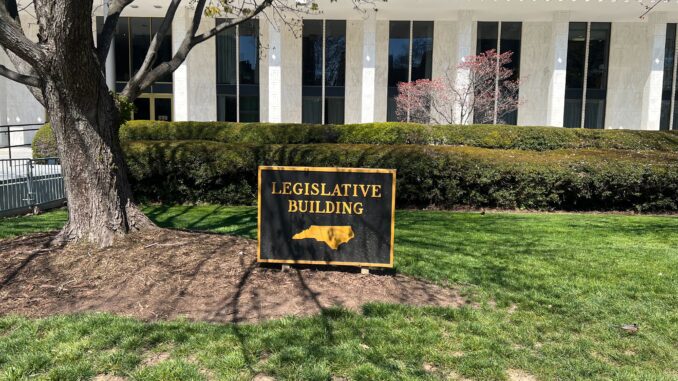
RALEIGH — A House bill is seeking to prohibit “compelled speech” at UNC System institutions.
House Bill 607, Prohibit Compelled Speech/Higher Ed., was filed by House Deputy Majority Whip Rep. Steve Tyson (R-Craven), Rules Committee Chairman Rep. Destin Hall (R-Caldwell) and freshman Rep. Ken Fontenot (R-Wilson).
Under the bill, the UNC Board of Governors would be directed to “develop and adopt a policy on free expression” that incorporates language that a UNC institution can’t require employment or student applicants to “endorse or describe their actions related to matters of contemporary political debate or social action.”
In effect, the bill mandates that “diversity statements” or similar solicitations cannot be required for potential employees or students.
Additionally, the bill says UNC institutions have to remain neutral and keep out of “public controversies.”
“The constituent institution may not take action, as an institution, on the public policy controversies of the day in such a way as to require students, faculty, or administrators to publicly express a given view of social policy,” the bill states.
If passed and signed into law, the bill would be enacted for the 2023-24 academic year.
The bill needs to pass through the House Committee on Education — Universities before heading to the committee that Hall chairs, the Operations and Rules Committee of the House.
House Bill 607 follows the passage of a resolution by the University of North Carolina at Chapel Hill Board of Trustees (UNC BOT) specifically aimed at curbing compelled speech.
“Make no mistake, compelled speech is compelled thought,” UNC BOT member Perrin Jones said during his remarks at the March 22 meeting. “Forcing statements, regardless of the goodness of their intent, is wrong as it violates an individual’s right to think, speak and act in an honest and open manner.”
The resolution, supporting an amendment of UNC Policy Section 300.5.1, was approved at the UNC BOT March 22 meeting.
The amendment’s policy revision restricts “vague or ideologically motivated statement policies of any kind across UNC campuses” in admissions, employment and professional advancement.
“University shall neither solicit nor require an employee or applicant for academic admission or employment to affirmatively ascribe to or opine about beliefs, affiliations, ideals, or principles regarding matters of contemporary political debate or social action as a condition to admission, employment, or professional advancement,” the policy revision states. “Nor shall any employee or applicant be solicited or required to describe his or her actions in support of, or in opposition to, such beliefs, affiliations, ideals, or principles.”
The resolution approved on March 22 builds on a free speech resolution passed by the UNC BOT in July 2022. The free speech resolution reconfirmed the board’s commitment to “institutional neutrality” as described in the Kalven Committee Report produced by the University of Chicago.
A recent report by the Foundation for Individual Rights in Education (FIRE) shows that scholars being punished for their speech has “skyrocketed over the last three years.”
The report says 1,080 scholar sanction attempts occurred between 2000 and 2022. Sanction attempts went from four instances annually in 2000 to 145 in 2022. Additionally, almost two-thirds of attempts resulted in sanction, including 225 terminations (698 of 1,080, or 65%), per the report.
“Cancel culture is particularly pernicious when it targets people charged with discovering and disseminating knowledge,” said FIRE Director of Faculty Outreach Komi Frey, lead author of the report. “Vocal, dogmatic minorities on the left and the right are trying to restrict the range of acceptable ideas in institutions of higher education, and this should alarm us all. You do not need to agree with a scholar’s teaching, research, or extramural speech to recognize that censorship is not the answer.”
The report includes a list of the most “controversial” sanction attempts, including the late Professor Mike Adams, who taught criminology at the University of North Carolina Wilmington and was subjected to four separate sanction attempts. Adams died by suicide in 2020.

